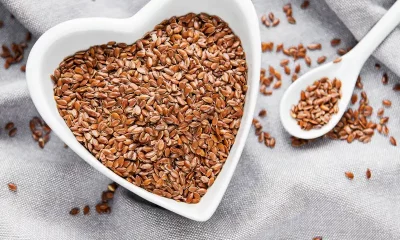Health
6 Benefits of Butterbur herb and side effects

6 Benefits of Butterbur Herb and side effects.
Seasonal allergies are often accompanied by a flurry of unpleasant symptoms. Sneezing, sniffling and itchy eyes are just some of the annoying side effects that come with the season.
If you’re like most, you’ve probably desperately reached for antihistamines to find quick relief from your allergies only to experience additional symptoms like drowsiness, dry mouth, or nausea.
Fortunately, there are natural allergy remedies, like the herb butterbur, that can help prevent symptoms without the unpleasant side effects.
Butterbur herb is good for more than just allergy season. It can be used year-round to relieve inflammation, prevent migraines, reduce asthma symptoms, and even protect the brain and heart from damage.
In the past, it was also used as a traditional treatment to help heal wounds, reduce symptoms of urinary tract infection, and fight fevers.
Available in a convenient capsule form, adding butterbur herb to your medicine cabinet can have a huge impact on your health and may even reduce your need for other medications.
Benefits of Butterbur Herb
1.- treats seasonal allergies
Allergic rhinitis, also known as hay fever or seasonal allergies, is an allergic response that produces symptoms such as sneezing and itchy eyes.
Although traditional treatment includes medications such as antihistamines, steroids, and decongestants, the herb butterbur can be an effective natural alternative to help reduce symptoms.
In one study, butterbur extract was shown to be significantly more effective in treating hay fever than placebo in a randomized, double-blind, placebo-controlled, parallel-group comparison.
In another study, the effects of butterbur were compared to cetirizine, also known as Zyrtec, a drug used to treat seasonal allergies. Not only was butterbur as effective as cetirizine in improving symptoms, but it also produced fewer negative side effects, such as drowsiness and fatigue.
For those who suffer from seasonal allergies, butterbur can be a great option to help lessen symptoms and avoid the adverse side effects that can occur with traditional medications.
2.- Relieves migraines
If you’ve ever suffered from migraines, you’re probably all too familiar with the long list of migraine symptoms that come with them.
Throbbing pain, sensitivity to light and sound, dizziness, nausea, and vomiting are all common side effects when you have a migraine.
Fortunately, many natural remedies can help lessen symptoms. Butterbur herb extract has been shown to help naturally treat migraines.
In one study, the benefits of butterbur cut migraine frequency by 48 percent over a four-month treatment period. Another trial found similar results, showing that the herb decreased the number of migraines by 47 percent and was significantly more effective than a placebo.
Additional research focused only on children and adolescents who took butterbur and found that migraine frequency was reduced by 63 percent, and 91 percent still felt improvements four months after treatment.
If you suffer from frequent migraines, butterbur can be a great natural remedy to have on hand. You may also want to consider other natural remedies, such as feverfew, which have been shown to provide migraine relief as well.
3.- Reduces asthma symptoms
Asthma is a common problem throughout the world, affecting approximately 300 million people and accounting for 250,000 premature deaths each year.
Some evidence shows that the benefits of butterbur herb could be used in combination with traditional treatment to help improve asthma symptoms.
One study measured the effects of butterbur in 80 participants with asthma for four months. Not only did the severity, duration, and number of asthma attacks decrease, but symptoms also improved, and 40 percent of participants reduced their use of asthma medications.
An animal study also showed that butterbur has potent anti-inflammatory properties that can help treat asthma.
Using butterbur, alone or with other asthma treatments, might help reduce asthma symptoms and severity while reducing the number of asthma attacks.
4.- Protects the brain
Interestingly, there is some evidence showing that butterbur might help keep your brain healthy and protect against oxidative damage.
Oxidative damage is caused by the buildup of damaging free radicals, compounds that form as a result of factors such as stress, pollution, and a poor diet. If antioxidants don’t neutralize free radicals, they can cause cell damage and even lead to chronic disease.
An animal study showed that the herb butterbur has a protective effect on the brain. It was able to prevent damage to the brain even after a neurotoxin was administered.
The herb butterbur also contains a plant compound called kaempferol, which is also found in foods such as broccoli, Brussels sprouts, spinach, apples, and green tea. Kaempferol boasts a long list of health benefits and has even been shown to prevent oxidative damage to the brain.
Compounds found in butterbur may help keep your brain healthy and prevent degenerative brain disorders such as dementia and Alzheimer’s disease.
5.- Promotes heart health
The herb butterbur is full of health-promoting compounds and antioxidants that can help improve your heart health and reduce certain risk factors for heart disease.
In an animal study, butterbur supplementation was shown to decrease total cholesterol, bad LDL cholesterol, and oxidative stress in mice. Another animal study also found that it improved cholesterol concentrations and even reduced body weight and fat accumulation.
The kaempferol found in this herb may also benefit heart health. Several studies have shown that it can protect against heart damage caused by heart attacks.
6.- Reduces inflammation
Although inflammation is a normal response of the immune system, more and more emerging research shows that chronic inflammation may be at the root of many diseases. Inflammation is thought to contribute to diseases like obesity, cancer, diabetes, and heart disease.
The herb butterbur contains powerful anti-inflammatory properties and has been shown to prevent the buildup of inflammatory cells in the body. Kaempferol, one of the components found in butterbur, also contains anti-inflammatory properties.
An animal study showed that kaempferol reduced levels of inflammatory markers and reduced oxidative stress in mice.
According to these studies, pairing butterbur with a balanced diet and healthy lifestyle may help decrease inflammation and prevent chronic disease.
How To Use Butterbur Herb
The herb butterbur is most commonly found as a supplement in capsule form and is widely available at most natural health stores, drug stores, and online retailers.
It is also found in some natural medicines, such as Petadolex. Petadolex is a medicine containing butterbur that is used to promote blood flow and prevent migraines.
Most studies show that butterbur is most effective when given in doses of 50 to 75 milligrams twice daily. You may want to start with a smaller amount and gradually increase your intake to assess tolerance.
Be aware that some butterbur-containing products may also contain pyrrolizidine alkaloids (PAs), a type of chemical that can cause liver damage and other adverse side effects. If you have liver problems, avoid raw butterbur and look for butterbur-free products to avoid this harmful chemical.
Also, be sure to look for a trusted brand with minimal ingredients to ensure you’re getting the best quality possible.
The butterbur plant in dried form or extract can also be used to make an allergy-fighting tea.
Butterbur Herb Side Effects and Precautions
Although generally safe and well-tolerated, some people may want to avoid butterbur.
Some people may be allergic to this herb. Butterfly allergies are more common in those who are also sensitive to other plants in the same family, such as ragweed, daisies, marigolds, and chrysanthemums. If you experience symptoms such as hives, itching, or swelling of the throat, you should stop using immediately and talk to your doctor.
If you are pregnant or nursing, the use of butterbur is not recommended as its effects have not yet been studied. Also, although it is safe and effective for children, it should only be given to children under the supervision of a healthcare professional.
You should also make sure to only use products labeled certified PA-free to avoid liver damage and other negative effects. Consuming raw, unprocessed butterbur is not recommended for those with liver problems in particular, as these harmful chemicals have not been removed.
Common side effects of butterbur include headache, diarrhea, fatigue, belching, and itchy eyes.
As always, if you experience negative side effects, you may want to lower the dosage or discontinue use and consult with your doctor.
Final Thoughts on Butterbur Herb Benefits
The butterbur herb has a long history of being used as a medicinal herb, treating everything from the plague to fevers and wounds.
Several recent studies have shown that it can effectively treat migraines, reduce seasonal allergy symptoms, protect the heart and brain, relieve inflammation, and lessen the severity of asthma.
It’s easy to add butterbur into your daily routine whether you’re using a supplement once or twice a day or brewing an occasional cup of butterbur tea.
Use alone or with other natural remedies in conjunction with a healthy lifestyle to help improve certain conditions and move toward better health.
Health
How to use Ginseng to boost your libido

Table of Contents
Health
6 Benefits of lavender soap

Table of Contents
- Nutritional value of lavender soap
- 6 Health Benefits of Lavender Soap
- Recommendation on how to make homemade lavender soap
- Discover the 6 shocking health benefits of lavender soap.
Homemade lavender soap is popular and a favorite of many people. Lavender has long been known for its excellent, mild fragrance. Who wouldn’t love the fragrance of these little purple flowers?
Due to the fragrance, people have been using lavender for cosmetics and other necessities like aromatherapy, perfumes, etc.
Lavender products are commonly related to the essential oil of the flower that has been known for its health benefits of lavender oil.
One of people’s favorite lavender products is lavender soap. People even start making their homemade lavender soap to reap the benefits of lavender soap.
So what are the health benefits of homemade lavender soap? Is it better than store bought products?
Read on to find out more about the value of homemade lavender soap, the health benefits of homemade lavender soap, and also the recommendation on how to make homemade lavender soap.
So, you may not only know about the health benefits of homemade lavender soap, but also the bale to make it on your own.
Nutritional value of lavender soap
Lavender soap is known to be beneficial for its natural value that supports the health of our skin. Fragrance can even help calm our minds, so it is often involved as one of the relaxing agents.
So what does lavender soap actually contain, especially homemade lavender soap? Here is the list:
• Natural aromatic oil
• Antibacterial agent
• Antifungal property
These compounds support the benefits of homemade lavender soap that we can obtain by making and using the soap regularly. It can effectively treat some of the skin problems that you have.
6 Health Benefits of Lavender Soap
Who would argue the specialty of homemade products? Especially in terms of ingredients and hygiene, and it is made for family use. The same goes for homemade lavender soap.
We can have more benefits from homemade lavender soap than store-bought lavender soap. These are some of the benefits:
1.- Relieves stress
A study conducted by Australia’s Charles Stuart University in 2005 concluded that lavender’s subtle floral scent is capable of altering brain waves and creating a sense of well-being. It is the main reason why lavender soap is able to relieve our stress.
Not only while using lavender soap, the process of making this homemade soap even gives you the feeling of relief, as the making process also allows you to have enough exposure to the natural relaxing fragrance of lavender flowers.
2.- Improves mood
Some people say that the DIY project is a remedy for your mood swings. And so some studies show. So, take the time to work on your homemade things like homemade lavender soap.Advertisements
Since it gives you time to refresh your mind, and after that you can get the beneficial effect of lavender soap, especially in relaxation and further elevating our mood.
3.- Treat insect bites
Lavender is known to have excellent homemade lavender soap, to treat mild infections such as insect bites. It will soothe the itching and restore the redness effectively. For this reason, we can use lavender products, including homemade lavender soap, to treat mild infections such as insect bites. It will soothe the itching and restore the redness effectively.
4.- Shampoo for natural hair
Not only beneficial for the skin, homemade lavender soap can also be used as a hair shampoo for its health benefits of lavender oil for hair and skin.
It is excellent for promoting hair growth as lavender is included in the List of Herbs for Hair Growth. In addition, lavender is also capable of preventing hair loss and eliminating dandruff.
The natural ingredients in homemade lavender soap will also give your hair some breaks from the man-made chemicals in the common shampoo we use.
5.- Softens the skin
Most people know the benefits of lavender for skin health. To add these benefits, we can prepare the creamy homemade lavender soap.
Over time, it will soften our skin by retaining the skin’s natural moisture. We can also add some other essential oil such as coconut oil with its remarkable benefits of using coconut oil as a skin moisturizer.
6.- Treat acne
Acne can be a common skin problem. But sometimes, it is very difficult to find the right treatment to treat acne. On the other hand, if you have acne not only on your face, but all over your body, such as on your back and neck. In this case, lavender soap can offer you the home remedy for acne.
Lavender’s antibacterial property is powerful in preventing bacterial infection. As we know, bacterial infection is one of the main causes of acne. Additionally, the use of lavender soap can also soothe inflamed acne and stimulate recovery.
The other benefits of homemade lavender soap are:
• Treat eczema
• Treat burns
• Prevent insomnia
• Cure headache
Recommendation on how to make homemade lavender soap
Surprisingly, we can get the benefits of homemade lavender soap from our own home. And FYI, it might be easier than you think before. Well, we just have to prepare some ingredients like:
• Unscented goat soap
• Lavender essential oil
• Dried lavender flowers
• Crude coconut oil
As for how it’s done, just fill a small saucepan with water and put a larger saucepan or metal bowl on it. Put the heat over medium heat, cut the soap into chunks and place in the largest container.
It is fine with raw coconut oil. Let them slowly melt into liquid. When melted, remove from heat and add lavender essential oil for fragrance.
For a more natural feel, you can also add dried lavender flowers to your homemade soap. This is what you cannot get from a common store bought product.
If you want a little color, you can also add a little food coloring to your homemade soap. But make sure the coloring agent is safe for your skin, and don’t waste the benefits of your homemade lavender soap.
After mixing all the ingredients, pour them into a silicone soap mold. Let them sit and harden for a few moments. After about an hour or when it’s set, you can remove it from the mold and enjoy your homemade lavender soap.
Health
Benefits of almond milk for skin

Discover the benefits of almond milk for the skin.
Did you know that almond milk provides us with omega 3 fatty acids and antioxidants that help us protect the skin against sun damage and environmental toxins?
Almond milk is one of the vegetable drinks that has gained fame throughout the world for its high content of essential nutrients that, when absorbed, provide many benefits to the body.
Low in calories and free of cholesterol and lactose, it has become one of the best supplements to lose weight and improve health, especially when there is a risk of cardiovascular disease.
However, beyond this, it also acts as a natural cosmetic, providing interesting benefits to the skin, especially when it has some imperfections.
It contains omega 3 fatty acids, vitamin E and other powerful antioxidants that, in addition to regulating the pH, provide a protective effect against the sun’s rays and toxins.
In addition, it can be combined with other healthy ingredients to prepare beauty treatments without having to invest too much.
In the following space, we want to share 5 good options so that you do not hesitate to try them within your routine.
1. Treatment to reduce dark circles based on almond milk
The omega 3 fatty acids and vitamin E contained in almond milk have an anti-inflammatory and moisturizing effect that favors the reduction of puffiness and dark circles.
Its daily use eliminates dark spots around the eyes and helps to give it a rejuvenated appearance.
Ingredients
•4 tablespoons of almond milk (40 ml)
•1 teaspoon of rose water (5 ml)
Preparation
•Combine almond milk with rose water for a natural toner.
•Dip a piece of cotton in the liquid and rub it on the dark circles under the eyes with gentle massages.
•Let it absorb well and remove excess with a clean cloth.
•Repeat its use every day, before starting the makeup routine.
2. Mask to exfoliate the skin
By combining the properties of almond milk with natural ingredients such as oatmeal and honey, we obtain an exfoliating cream that helps us remove dead cells and impurities from the face.
Ingredients
•6 tablespoons of almond milk (60 ml)
•1 tablespoon of oatmeal (10 g)
•1 tablespoon of honey (25 g)
Preparation
•Put all the ingredients in a bowl and mix them until you get a thick paste.
•Cleanse the face well and then spread the product with gentle circular movements.
•Let the compounds act for 20 minutes and rinse.
•Repeat the treatment 2 times a week.
3. Natural makeup remover
One of the little-known uses of almond milk in terms of facial care is its ability to replace creams to remove makeup.
Its properties facilitate the removal of cosmetics and, unlike chemical products, provide extra nutrition to the skin.
Ingredients
•6 tablespoons of almond milk (60 ml)
•1 teaspoon of vegetable oil (5 g)
Preparation
•Combine the tablespoons of almond oil with a teaspoon of vegetable oil, it can be olive or coconut, to facilitate makeup removal.
•Take a clean cloth, dip it in the product and gently rub it to remove the cosmetics.
•Repeat its use every night before going to sleep.
4. Pore Cleansing Lotion
The astringent and anti-inflammatory action of almond milk makes it a good solution for cleaning clogged and enlarged pores.
Combined with a little tea tree oil, we obtain a natural lotion to balance oil production and remove blackheads.
Ingredients
•6 tablespoons of almond milk (60 ml)
•3 drops of tea tree essential oil
Preparation
•Add the tea tree oil to the almond milk and, after combining it, rub it on the skin with the help of a cotton ball.
•Wait for it to be absorbed well and remove the excesses with a damp cloth.
•Repeat its use every day, twice a day if you have oily skin.
5. Anti-wrinkle mask
The essential nutrients contained in this ingredient, especially its antioxidants, help prevent premature signs of aging by promoting the production of collagen and elastin.
Its absorption minimizes the negative effects of free radicals and, incidentally, nourishes the delicate skin where expression lines are formed.
Ingredients
•6 tablespoons of almond milk (60 ml)
•1 tablespoon of turmeric powder (10 g)
•4 tablespoons of honey (100 g)
Preparation
•Put the almond milk and turmeric in a container and mix until you get a homogeneous product.
•Next, add the honey, continue mixing, and, after obtaining a paste, spread it on the skin.
•Be sure to cover any wrinkle-sensitive areas, including the neck and décolletage.
•Wait for it to act for 30 minutes and rinse.
•Repeat your application 3 times a week.
As you can see, there are very interesting ways to turn almond milk into an ally for the beauty of the skin.
Dare to try these treatments and check that you do not need to spend too much money to pamper yourself.
-

 Benefits5 months ago
Benefits5 months agoThe Benefits of Joining Gym Lumolog – Improve Your Fitness & Health
-

 Food1 year ago
Food1 year ago10 + Benefits of carrot juice and side effects
-

 Health1 year ago
Health1 year ago50 Super Healthy (And Very Often Cheap) Foods
-

 Health1 year ago
Health1 year ago5 Shocking health benefits of kinkeliba and side effects
-

 Health1 year ago
Health1 year ago15 health benefits of soursop leaves tea and side effects
-

 Food1 year ago
Food1 year ago8 shocking benefits of leek juice and side effects
-

 Health1 year ago
Health1 year ago15 Benefits of lipton tea and side effects
-

 Health1 year ago
Health1 year agoBenefits of guava leaves Sensually












